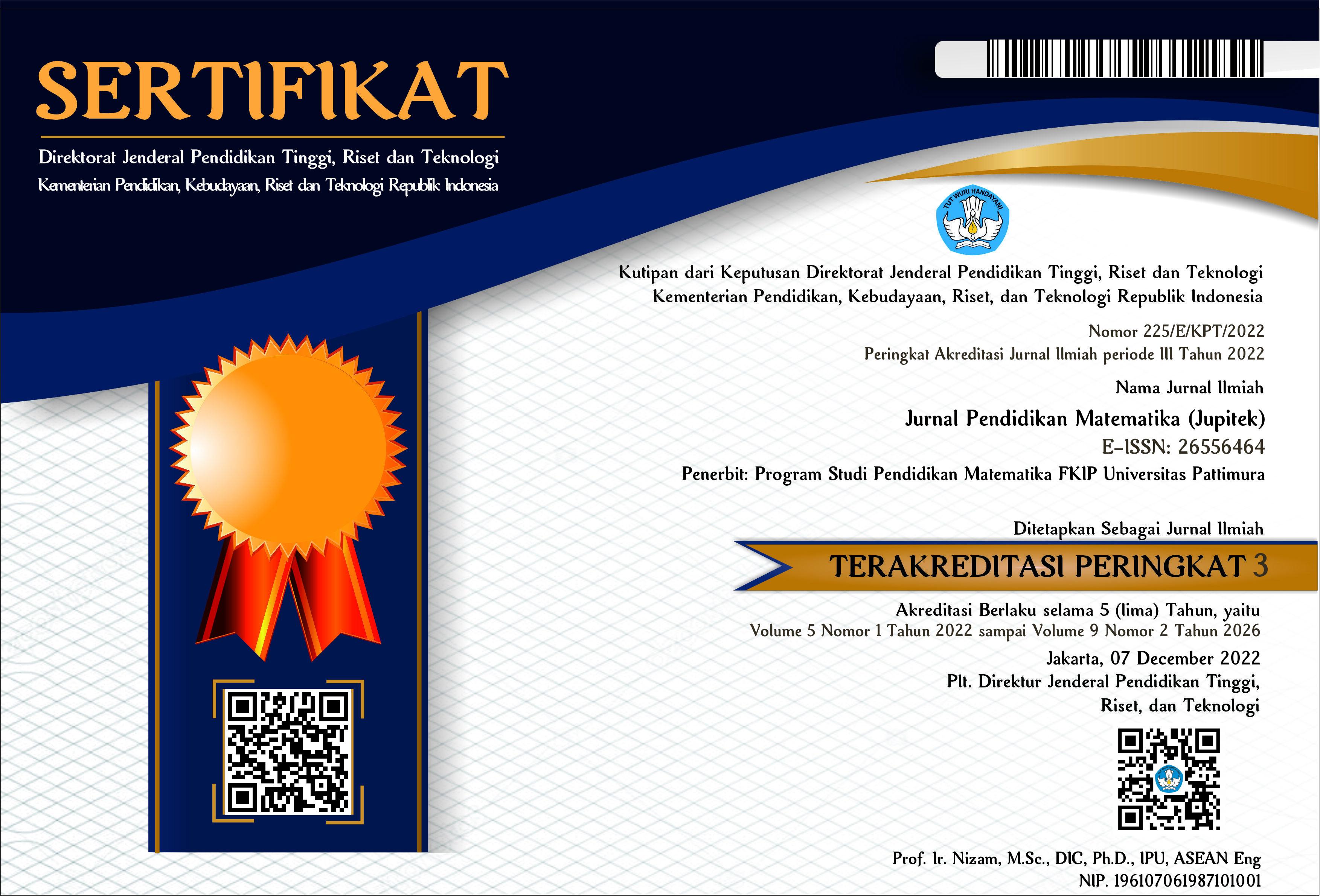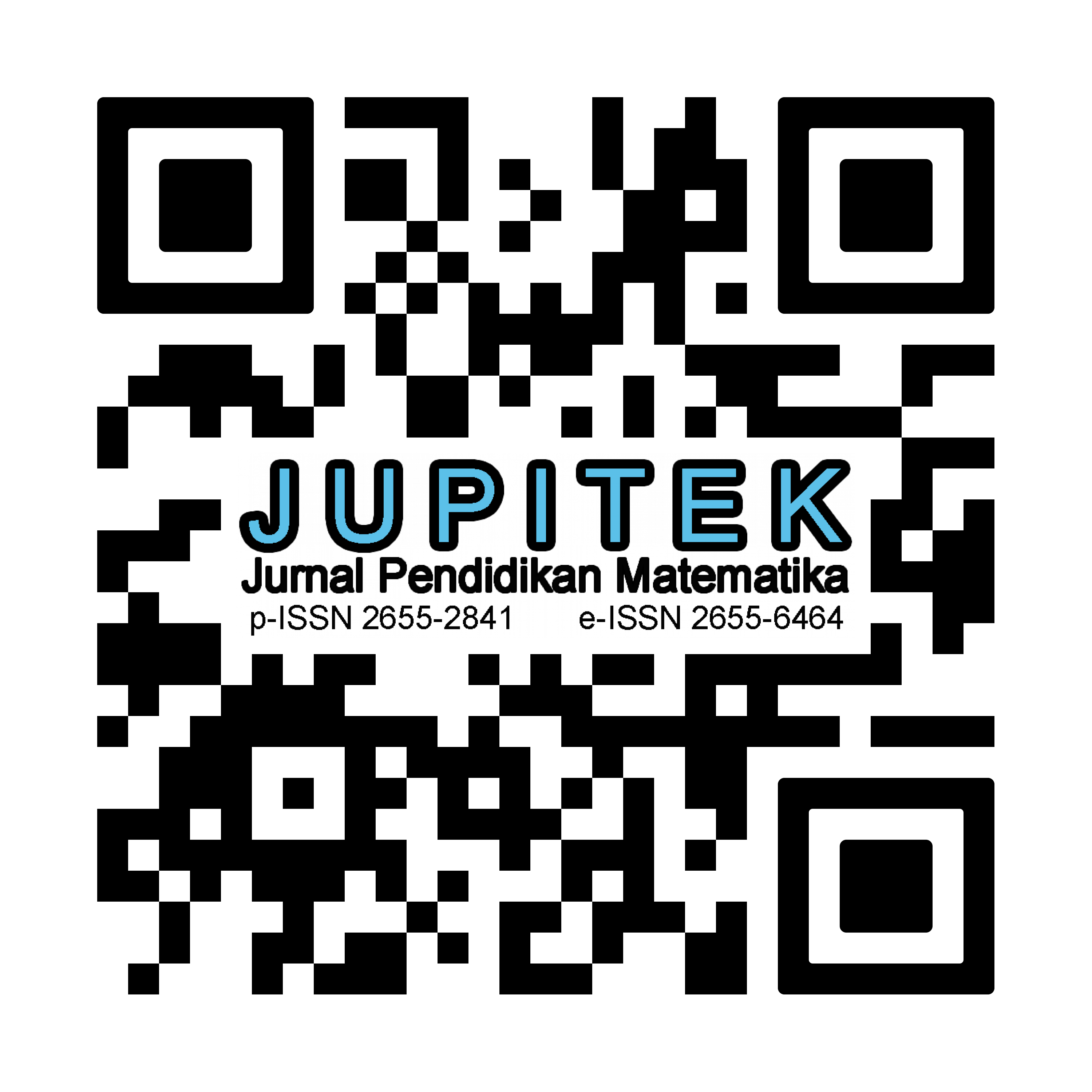PERBANDINGAN METODE PROBLEM BASED LEARNING DENGAN METODE KONVENSIONAL TERHADAP KEMAMPUAN PEMECAHAN MASALAH DAN SELF EFFICACY MATEMATIS MAHASISWA PADA MATA KULIAH MATEMATIKA TEKNIK
Abstract
Penelitian ini bertujuan untuk mengetahui pengaruh metode Problem Based Learning (PBL) dan metode konvensional terhadap kemampuan pemecahan masalah dan self efficacy matematis mahasiswa. Jenis penelitian ini pretest-postest control group design dengan kategori quasi eksperiment. Hasil penelitian uji independent sample t-tes menunjukan bahwa metode PBL lebih efektif dari pada metode konvensional dalam perkuliahan matematika teknik. Hasil uji menunjukan bahwa sig (2-tailed) sebesar 0,000 < 0,005. Dengan kata lain, ada perbedaan antara metode PBL dengan konvensional terhadap kemampuan pemecahan masalah mahasiswa. Besar perbedaannya dari kedua kelas dapat dilihat pada hasil mean postes kelas ekperimen 75,23 dan mean postes kelas kontrol 54,32. Artinya, menunjukan bahwa penerapan metode Problem Based Learning berpengaruh terhadap kemampuan pemecahan masalah mahasiswa dibandigkan metode konvensional. Hal ini linier dengan hasil sebaran angket self efficacy mahasiswa yang diterapkan metode Problem Based Leaning perbedaan dari mahasiswa yang menggunakan metode konvensional. Hasil uji menunjukan Based on Mean adalah 0,03>0,05
Downloads
References
Alan, U. F., & Afriansyah. (2017). Kemampuan Pemahaman Matematis Siswa Melalui Model Pembelajaran Auditory Intellectualy Repetition dan Problem Based Learning. Jurnal Pendidikan Matematika , 11(1), 3-13.
Amiluddin, R., & Sugiman, S. (2016). Pengaruh Problem Posing dan PBL terhadap Prestasi Belajar dan Motivasi Belajar Mahasiswa Pendidikan Matematika. Jurnal Riset Pendidikan Matematika, 3(1), 100-108.
BNSP. (2016). Kurikulum Tingkat Satuan Pendidikan. Jakarta: Dirjen.
Erya Santoso, F., Elvis Napitupulu, E., & Amry, Z. (2019). Metacognitive Level Analysis of High School Students in Mathematical Problem-Solving Skill. American Journal of Educational Research, 7(12), 919–924.
Fatimah, F. (2013). Kemampuan Komunikasi Matematis dan Pemecahan Masalah Melalui Problem Based-Learning. Jurnal Penelitian dan Evaluasi Pendidikan, 16(1), 249–259.
Han, S., Capraro, R., & Capraro, M. M. (2015). How Science, Technology, Engineering and Mathematics (STEM) Project-Based Learning (PBL) Affects High Middle, and Low Achievers Differently: The Impact of Student Factors on Achievement. International Journal of Science and Mathematics Education, 13(5), 1089–1113.
Kazemi, F., & Ghoraishi, M. (2012). Comparison of Problem-Based Learning Approach and Traditional Teaching on Attitude, Misconceptions and Mathematics Performance of University Students. Procedia - Social and Behavioral Sciences, 46, 3852–3856.
Meke, K. D. P. (2020). Pembelajaran Problem Based Learning dengan Penggunaan Bahan Manipulatif ditinjau dari Minat Belajar Matematika. 13(2), 14.
Middleton, J. A., & Spanias, P. A. (1999). Motivation for Achievement in Mathematics: Findings, Generalizations, and Criticisms of the Research. Journal for Research in Mathematics Education, 30(1), 65.
Nahdi, D. S. (2018). Eksperimentasi Model Problem Based Leraning dan Model Guided Discovery Learning Terhadap Kemampuan Pemecahan Masalah Matematis Ditinjau dari Self Efficacy Siswa. Jurnal Cakrawala Pendas, 4(1), 50-56.
Novianti, D. E., Khoirotunnisa’, A. U., & Indriani, A. (2017). Profil Pemecahan Masalah Matematika Dalam Menyelesaikan Permasalahan Pemrograman Linear Ditinjau Dari Kemampuan Komunikasi Matematis. Jurnal Ilmiah Pendidikan Matematika, 6(1), 53-59.
Preston, D. L. (2007). 365 steps to self-confidence: A complete programme for personal transformation - in just a few minutes a day. Oxford: How To Books.
Riduan. (2013). Dasar-dasar statistika. Bandung. Bandung: Alfabeta.
Sariningsih, R., & Purwasih, R. (2017). Pembelajaran Problem Based Learning untuk Meningkatkan Kemampuan Pemecahan Masalah Matematis dan Self Efficacy Mahasiswa Calon Guru. JNPM (Jurnal Nasional Pendidikan Matematika), 1(1), 163.
Witz, K., Hinkle, D. E., Wiersma, W., & Jurs, S. G. (1990). Applied Statistics for the Behavioral Sciences. Journal of Educational Statistics, 15(1), 84.
Copyright (c) 2020 Ellysa Kusuma Laksanawati, Rofiroh Rofiroh

This work is licensed under a Creative Commons Attribution-NonCommercial-ShareAlike 4.0 International License.
License and Copyright Agreement
By submitting a manuscript to Jurnal Pendidikan Matematika (JUPITEK), the author(s) certify and agree to the following terms:
- Originality and Authority: The submitting author is authorized by all co-authors to enter into this agreement. The manuscript describes original work that has not been published previously in a peer-reviewed journal, nor is it under consideration for publication elsewhere.
- Approval: Its publication has been approved by all author(s) and by the responsible authorities of the institutions where the work was carried out.
- Rights: The authors secure the right to reproduce any material that has already been published or copyrighted elsewhere.
- Licensing and Copyright: Authors retain the copyright to their work.
- License Grant: The authors grant Jurnal Pendidikan Matematika (JUPITEK) the right of first publication, with the work simultaneously licensed under the Creative Commons Attribution-NonCommercial-ShareAlike 4.0 International (CC BY-NC-SA 4.0).
- Self-Archiving: Authors are permitted and encouraged to deposit the published version of their article in institutional repositories, on their personal websites, and other academic platforms, with proper acknowledgment of its initial publication in Jurnal Pendidikan Matematika (JUPITEK).






.png)


